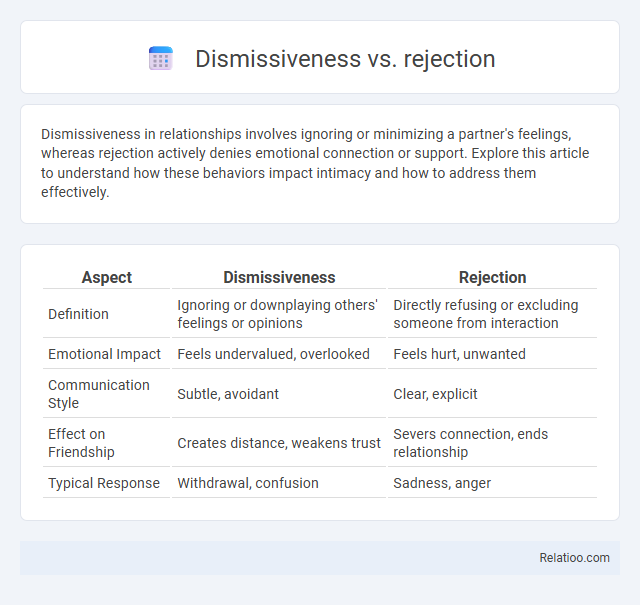Dismissiveness in relationships involves ignoring or minimizing a partner's feelings, whereas rejection actively denies emotional connection or support. Explore this article to understand how these behaviors impact intimacy and how to address them effectively.
Table of Comparison
| Aspect | Dismissiveness | Rejection |
|---|---|---|
| Definition | Ignoring or downplaying others' feelings or opinions | Directly refusing or excluding someone from interaction |
| Emotional Impact | Feels undervalued, overlooked | Feels hurt, unwanted |
| Communication Style | Subtle, avoidant | Clear, explicit |
| Effect on Friendship | Creates distance, weakens trust | Severs connection, ends relationship |
| Typical Response | Withdrawal, confusion | Sadness, anger |
Understanding Dismissiveness: Definition and Context
Dismissiveness involves minimizing or ignoring others' feelings, thoughts, or concerns, often leading to emotional invalidation in interpersonal relationships. Unlike rejection, which outright denies acceptance or approval, dismissiveness subtly undermines the importance of the other person's perspective without directly refusing it. Recognizing dismissiveness requires understanding its impact on communication, as it can erode trust and hinder effective dialogue by conveying indifference or superiority.
What is Rejection? Key Differences
Rejection is the act of refusing to accept, consider, or approve something or someone, often leading to feelings of exclusion or invalidation. Unlike dismissiveness, which involves trivializing or minimizing others' thoughts or emotions, rejection is a more explicit denial or refusal that can deeply impact self-esteem and interpersonal relationships. Key differences lie in the intent and expression: rejection clearly denies acceptance, whereas dismissiveness subtly undermines significance without outright refusal.
Psychological Impact: Dismissiveness vs Rejection
Dismissiveness often undermines Your self-esteem by invalidating feelings and experiences, creating a sense of invisibility that can lead to emotional withdrawal. Rejection triggers a stronger psychological impact by activating feelings of unworthiness and social exclusion, increasing vulnerability to anxiety and depression. Understanding these distinctions helps in addressing emotional wounds and fostering healthier interpersonal dynamics.
Common Signs of Dismissive Behavior
Common signs of dismissive behavior include ignoring or minimizing your feelings, consistently interrupting during conversations, and avoiding engagement in meaningful dialogue. Dismissiveness often manifests as nonverbal cues like eye-rolling, sighing, or turning away, which communicate lack of interest or respect. Recognizing these patterns helps you address emotional invalidation and fosters healthier communication dynamics.
Identifying Rejection in Relationships
Rejection in relationships manifests as clear, intentional refusal or denial of emotional connection, often causing significant distress and signaling deeper compatibility issues. Dismissiveness, however, involves minimizing or disregarding a partner's feelings or needs without explicit denial, leading to emotional neglect rather than outright refusal. Recognizing rejection requires attention to consistent patterns of exclusion and withdrawal, distinguishing it from subtle dismissiveness that undermines trust over time.
Emotional Responses Triggered by Dismissiveness
Dismissiveness often triggers feelings of invalidation and frustration, as individuals perceive their emotions or opinions are being ignored or minimized. Unlike rejection, which conveys outright denial or exclusion, dismissiveness communicates subtle disregard, undermining emotional connection and trust. This emotional response can lead to increased anxiety, decreased self-esteem, and reluctance to express feelings openly in future interactions.
Coping Strategies for Handling Rejection
Coping strategies for handling rejection involve recognizing emotional responses and practicing self-compassion to build resilience. Establishing clear boundaries and engaging in positive self-talk help mitigate feelings of dismissal and foster healthy emotional processing. Seeking social support and reframing negative experiences enable individuals to transform rejection into personal growth opportunities.
Dismissiveness in Professional Settings
Dismissiveness in professional settings often manifests as ignoring or minimizing colleagues' ideas, which can undermine collaboration and stifle innovation. Unlike outright rejection that clearly denies a proposal, dismissiveness subtly devalues contributions, negatively impacting team morale and communication effectiveness. Your ability to recognize and address dismissive behavior fosters a more inclusive and productive workplace environment.
The Long-Term Effects on Self-Esteem
Dismissiveness often leads to subtle erosion of self-esteem by making individuals feel undervalued and unheard, fostering internal doubts about their worth over time. Rejection imposes a more direct blow to self-esteem, triggering feelings of unworthiness and social exclusion that can persist and impact relationships and confidence deeply. Chronic experiences of either dismissiveness or rejection contribute to long-term psychological effects such as anxiety, depression, and diminished self-worth, highlighting the critical need for emotional validation in healthy self-esteem development.
Transforming Negative Interactions into Growth
Dismissiveness, rejection, and avoidance often hinder personal growth by shutting down communication and emotional connection, but recognizing these patterns allows you to transform negative interactions into opportunities for development. By fostering empathy and practicing active listening, you can shift conflict into constructive dialogue that strengthens relationships. Embracing vulnerability helps dismantle defensive behaviors, turning dismissal or rejection into a catalyst for mutual understanding and growth.

Infographic: Dismissiveness vs Rejection
 relatioo.com
relatioo.com